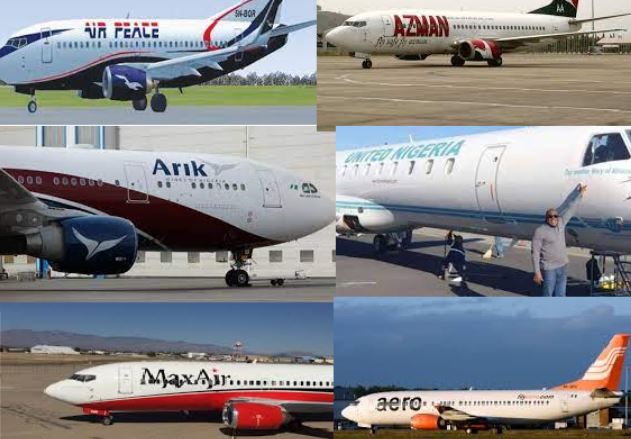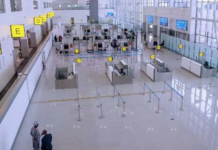Operators say scarcity of aviation fuel and forex, may cause shutdown of the aviation sector.
By Emma Ogbuehi
The Airline Operators of Nigeria (AON), has raised the alarm over new developments that are threatening smooth operation of air transport in the country.
AON said the new challenges have the capacity to cause a shutdown of the aviation sector.
According to a statement made available to journalists by the group, the recent suspension of scheduled flight operations by Nigeria’s foremost carrier, Aero Contractors, is a signal that the federal government need not take lightly.
In the state signed by AON’s spokesman, Prof. Obiora Okonkwo, the group listed scarcity and high cost of aviation fuel and also, the high rate of foreign exchange as major challenges that could force major shutdowns as operational costs have gone beyond the roofs.
The AON also listed the immediate shutdown of Runway 18L at the domestic airport in Lagos as contributing to clogs in operational efficiency of airlines even as it had forced about 15 percent increase in fuel consumption with attendant delays.
READ ALSO:
Airline operators fault Oil marketers over aviation fuel price
It called on the Federal government to intervene to save a major crumbling of the sector which it said renders essential services for the growth of the economy.
While lauding government and the leadership of the House of Representatives and its Committee on Aviation its previous interventions which created a three-month fuel supply window through the Nigerian National Petroleum Corporation (NNPC), AON said more of such interventions will save the sector from total collapse as airlines are beginning to restrict scheduled flight operations to only major airports.
The AON statement titled “Airlines Continue to Struggle as Aviation Fuel, Foreign Exchange Crisis Worsen” reads in part: “The Airline Operators of Nigeria (AON) would like to notify the general public that the JetA1 crisis which began in late February and deteriorated further through the months of March to May, has further worsen and currently threatening the ability of airlines to continue operations. The price of JetA1 rose suddenly from N200 in December 2021 to over N400 per litre in February. Today the price has skyrocketed to over N800 per litre.
“On top of the continuous rise in the price of Aviation fuel, supply is at best epileptic and unpredictable at several airports across the country there by causing flight delays, and even cancellations, as airlines queue for fuel at airports across the country.
“Added to the already difficult situation, is the high cost and scarcity of foreign exchange. It is pertinent to note that airlines carry out most of their activities in US dollars which today sells for N630 to $1; and is sadly also, in short supply. To say the least, airlines are in a ‘life and death’ struggle to secure the foreign exchange that they urgently need to acquire spare parts to ensure the regular routine and scheduled maintenance of aircraft. This is a major influence on how quickly a grounded aircraft can be fixed and restored for flight operations, which impacts greatly on the reliability of schedules, growth of the industry and economic growth and sustainability.
“The reality of the situation in the industry is exacerbated by the action of the Federal Airports Authority of Nigeria (FAAN), which in a NOTAM of July 5, 2022 announced the closure of the domestic runway (18L) of Murtala Muhammed Airport (MMA), Ikeja, beginning July 8, 2022. The closure is for a period of 90 days.
“In the face of the heavy burden already inflicted on airlines by the worsening Jet A1 crisis, it is most unfortunate that the Federal Airports Authority of Nigeria (FAAN) chose this period to close the runway. The ill-timed and unfortunate decision taken at very short notice to airlines has further crippled air transport operations by causing unsustainable additional operating costs and severely inconveniencing the airlines and passengers.
“The closure of the main domestic runway of MMA automatically adds an additional 10-15% more fuel costs per sector into and out of the domestic airport in Lagos, based on the additional flight and taxi time incurred as a result. The airlines have already felt these additional costs within the first week of the closure of the runway. This unnecessary burden is unsustainable for a 3-month period on the airlines; especially for the fact that the JetA1 crisis has worsened significantly and the situation remains unpredictable.
“Moreover, the additional 30 minutes taxi time to the apron forced on the airlines by the closure of runway 18L impacts negatively on schedule reliability to sunset airports around the country leading to delays and cancellation of late flights to such airports.
“While we welcome the effort by FAAN to install runway lighting on Runway 18L after being delayed for so long, it is pertinent to state that international best practice for such critical airfield infrastructure projects is for the airport operator to enter into discussions with all affected parties, to arrive at an optimal arrangement that allows the work to be done, while limiting the inconvenience, economic impact and safety implications on all concerned.
“Going forward, the Airline Operators of Nigeria (AON) wish to use the medium to graciously show appreciation to the Federal Government of Nigeria, leadership of the House of Representatives, especially the House Committee on Aviation, for their concern, and previous actions, which led to a mutually beneficial and cost-effective three-month aviation fuel supply window through the Nigerian National Petroleum Corporation (NNPC). That intervention greatly impacted on the aviation sector and solved what would have been a major national embarrassment.














